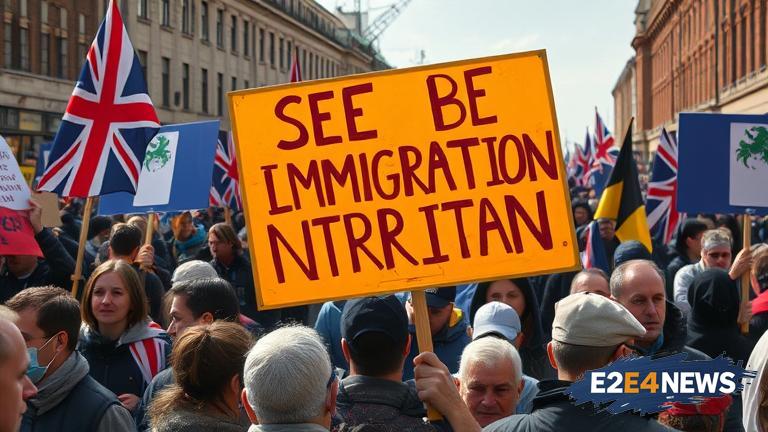Hundreds of anti-immigration protesters gathered in Nottingham, a city in the East Midlands region of England, to express their concerns and frustrations about the current immigration policies in the UK. The protest, which was organized by a group of local residents, aimed to raise awareness about the perceived negative impacts of immigration on the local community. The protesters, who were mostly from the Nottingham area, carried signs and banners with slogans such as ‘Stop Immigration’ and ‘Britain First’. The protest was peaceful, but it sparked concerns among local authorities and community leaders, who fear that such events could lead to increased tensions and divisions within the community. The UK has been experiencing a significant influx of immigrants in recent years, which has led to debates and discussions about the country’s immigration policies. The government has introduced various measures to control immigration, but many people feel that more needs to be done to address the issue. The protest in Nottingham is just one example of the growing concerns and frustrations about immigration in the UK. Many people believe that immigration is putting a strain on public services, such as healthcare and education, and that it is also leading to increased competition for jobs and housing. Others argue that immigration is essential for the UK’s economic growth and that it brings many benefits, such as cultural diversity and innovation. The protest in Nottingham was not without controversy, with some people accusing the organizers of being racist and xenophobic. However, the organizers denied these allegations, stating that their concerns were about the impact of immigration on the local community, rather than about the immigrants themselves. The protest was attended by people from all walks of life, including families with young children and elderly residents. Some of the protesters spoke to the media, expressing their concerns and frustrations about the current immigration policies. One protester stated that she was worried about the impact of immigration on the local school system, while another protester expressed concerns about the strain on the NHS. The protest was monitored by the police, who ensured that it remained peaceful and that there were no incidents of violence or disorder. The local authorities have stated that they will be reviewing the protest and assessing its impact on the community. The UK government has also been made aware of the protest and has stated that it will be taking the concerns of the protesters into consideration when reviewing its immigration policies. In recent years, the UK has seen a significant increase in anti-immigration protests and rallies, with many people expressing concerns about the impact of immigration on their communities. The government has introduced various measures to control immigration, including the introduction of a points-based system and increased border controls. However, many people feel that more needs to be done to address the issue and to ensure that immigration is managed in a fair and sustainable way. The protest in Nottingham highlights the need for a nuanced and informed debate about immigration, one that takes into account the complex issues and concerns surrounding this topic. It also highlights the need for community leaders and local authorities to work together to address the concerns of local residents and to promote greater understanding and cohesion within the community. The UK’s immigration policies are likely to remain a topic of debate and discussion in the coming months and years, with many people calling for a more balanced and sustainable approach to immigration. As the UK continues to navigate the complexities of immigration, it is essential that all stakeholders, including the government, community leaders, and local residents, work together to find solutions that benefit everyone. The protest in Nottingham is a reminder that immigration is a complex and multifaceted issue, one that requires careful consideration and thoughtful debate. By working together and engaging in open and honest discussions, we can build a more inclusive and cohesive society, one that values diversity and promotes the well-being of all members of the community.
